 |
| MegaPrime/MegaCam Home |
| CFHT Home |
| General Information |
| Instrument Description |
| Press Release April 8, 2003 |
| Publications |
| Acknowledgment Text |
| Specifications & Performance |
| Quick Performance Summary |
| General Summary |
| Technical Considerations |
| Off-field bright stars immunity |
| Shutter ballistics |
| Baffling & pinhole mask |
| On-sky Instrument History |
| Observing Runs |
| Observing Statistics |
| Observing Statistics II |
| Upgrades & Problems |
| Zeropoint History |
| New Observing Process |
| Exposure Time Calculator |
| Mapping Stars & Pointings |
| Queued Service Observing |
| QSO PH2 |
| SkyProbe |
| Data Preprocessing & Calibration |
| Elixir System Information |
| Raw Data Description |
| CFHT Data Preprocessing |
| CFHT Data Calibration |
| CFHT MetaData Products |
| Raw & Elixir FITS headers |
| Elixir Releases History |
| Elixir Real-Time |
| Elixir RT Field Guide |
| Elixir RT Status |
| Flat-Fields Status |
| Standards Status |
| Instrument Operations |
| Cooling Status |
| Cryostat Status |
| External Related Sites |
| Data Archiving at CADC |
| Data Processing at Terapix |
| Contacts |
| Support Astronomer |
| Off-field nearby bright stars immunity | |||||||||||||||||||||||||||||||||||||||
|
Scattered light from nearby bright stars was a serious issue on
CFH12K despite all the efforts to improve the internal baffling
of the original CFHT prime focus and wide-field corrector. MegaPrime
has been designed taking note of that important constraint and the results
are very convincing: nearby off-field bright stars are not an issue anymore.
To run this crucial test, we have placed Sirius at a variety of positions close to the mosaic to test the ability of MegaPrime to reject scattered light from nearby bright source. Sirius was placed a several positions North and South of the mosaic center, ranging from 0.6 degrees to 4.0 degrees (see table) from the center of the mosaic. All exposures were 30 seconds with the r' filter. In 30 seconds, Sirius should deposit roughly 4.5 x 10^12 electrons in a circle 2 arcsec diameter. The table shows the measured median sky background on the various images. Only the 0.6 degree offset images (in any direction), in which Sirius is nearly on the mosaic, show any significant gradient.
The example image from Figure 1 shows the result for Sirius placed 0.6 degrees East of the mosaic (0.1 degree off the edge of the mosaic). The blue contour represents 600 counts per pixel and the red represents 1200 counts per pixel. This image is scaled with [white = 50 counts per pixel] and [black = 1300 counts per pixel]. The plot of Figure 2 shows a cut across this image in the X direction giving counts per second per pixel versus the approximate pixel distance from Sirius.
The following inverted images are scaled with [white = 50 counts per pixel] and [black = 500 counts per pixel].
Note that the low-level squarish structures near the center are the result of internal LED light injection
in the camera beam as these frames were taken during the first engineering phases.
|

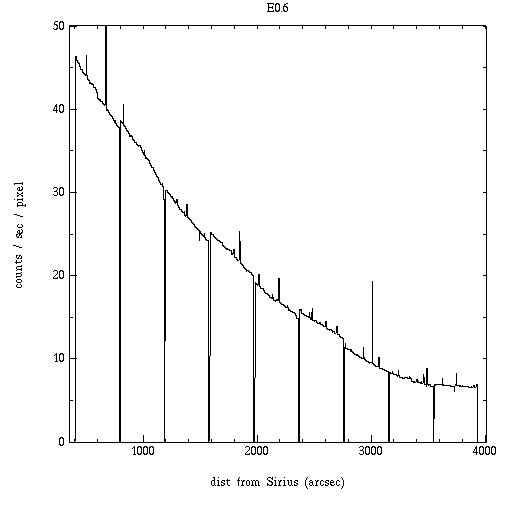
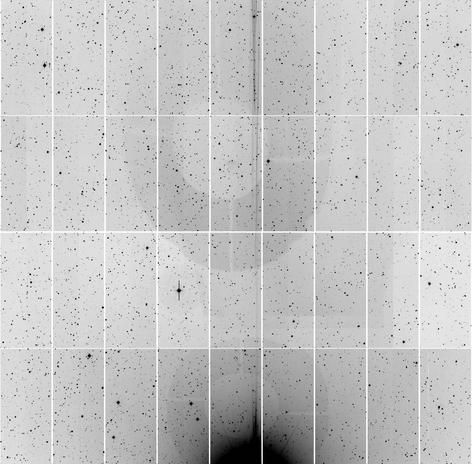 North 0.6
North 0.6 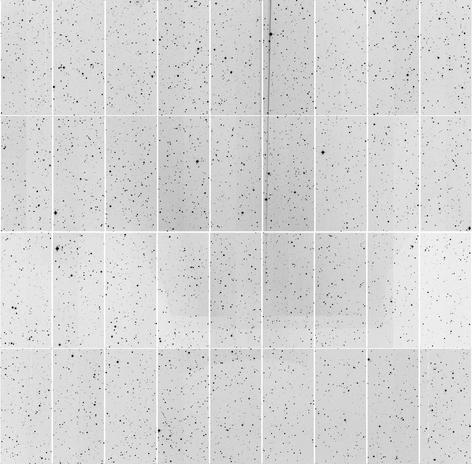 North 1.0
North 1.0 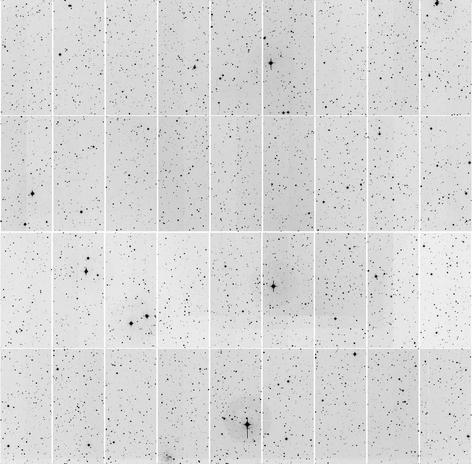 North 2.0
North 2.0 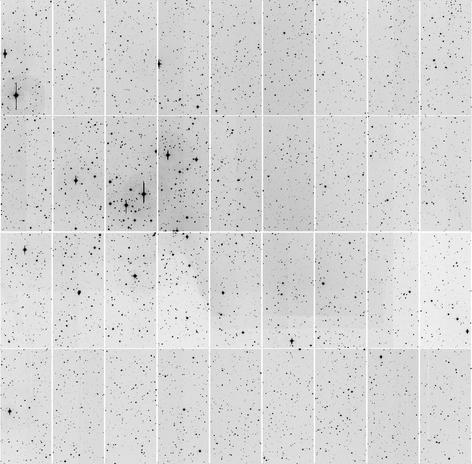 North 4.0
North 4.0 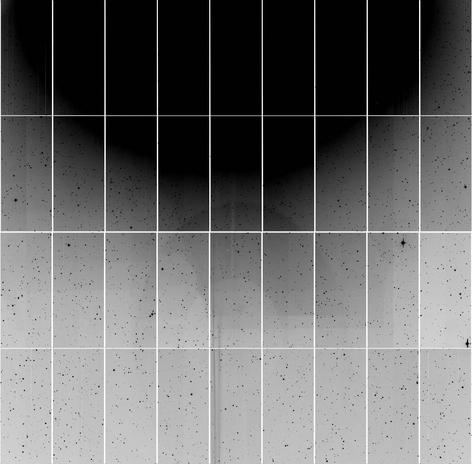 South 0.6
South 0.6 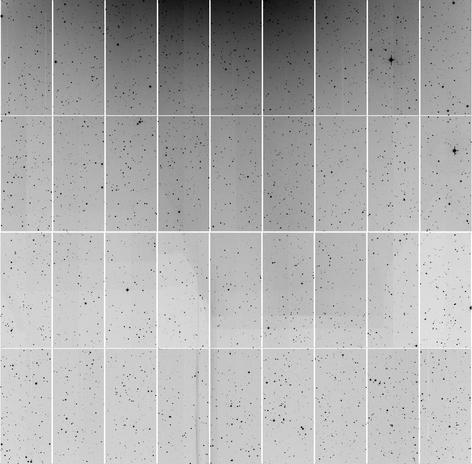 South 1.0
South 1.0 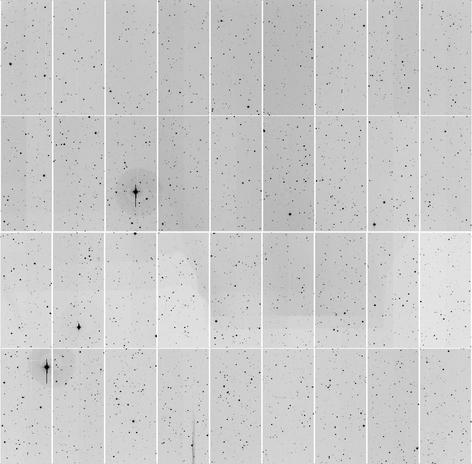 South 2.0
South 2.0 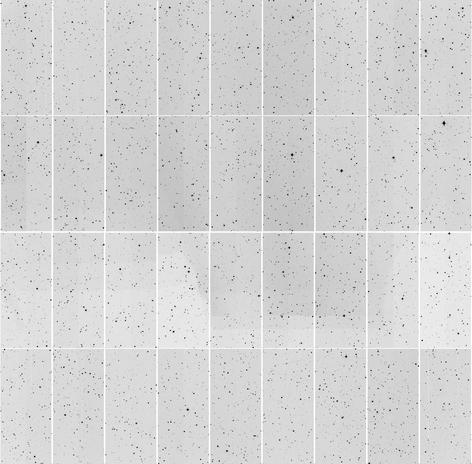 South 4.0
South 4.0 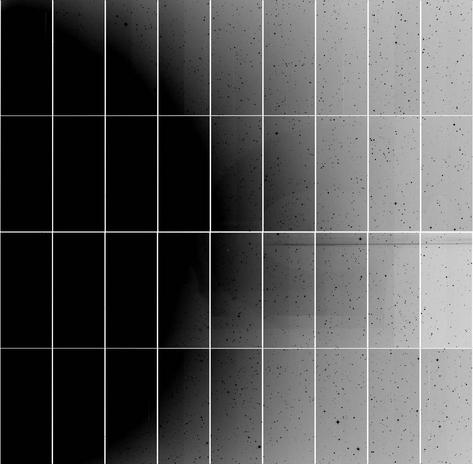 East 0.6
East 0.6